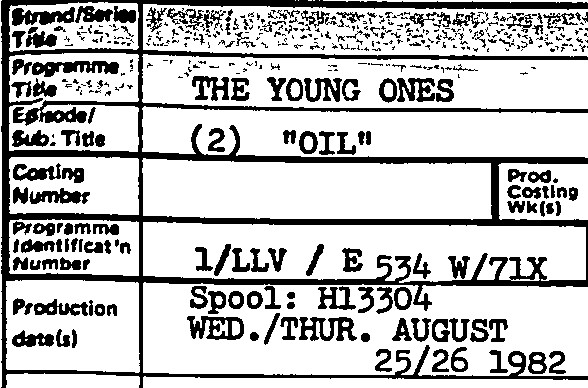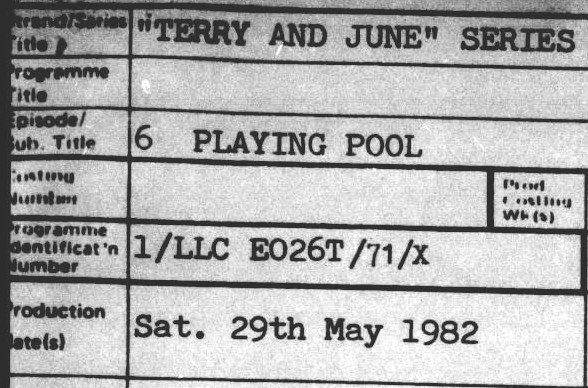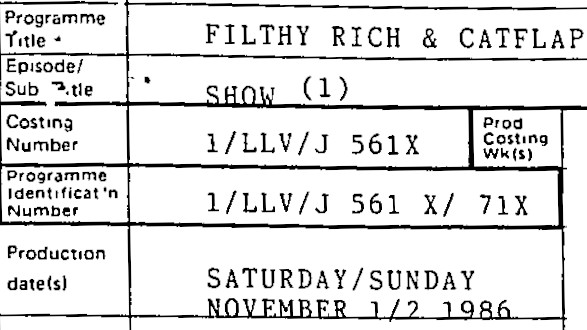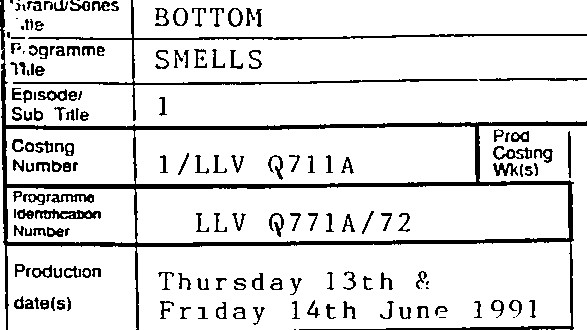Old TV shows gather anecdotes over the years. They gather anecdotes until it’s sometimes difficult to see the real story through the detritus. It’s not really anybody’s fault. It just happens.
A case in point. Why were there bands in The Young Ones? If you’ve read much about the show or watched any documentaries, you already know the answer. Take the second episode of A History of Alternative Comedy (TX: 17/1/99):
PAUL JACKSON: It had kinds of quirky elements in it already in that first script, but I said if we could just put a band in or something, because then we’ll be a variety show, and we’ll get slightly more money. So we put Nine Below Zero in, playing in the boys room.
Nearly two decades later, in Gold’s How The Young Ones Changed Comedy (TX: 26/05/18), this story is still being repeated:
ADRIAN EDMONDSON: It got funding from the variety arm of the BBC budget, which meant it had to have a band in each week. So it wasn’t us putting a band in: it had to have a band in.
The best and most comprehensive version of the tale is also told by Paul Jackson, in this BFI panel from 2018. (To his credit, he labels it as an old story by now.)
PAUL JACKSON: By having a band in, we came under the Variety department, and the Variety shows – Two Ronnies, Morecambe and Wise and so on – used to get two days in the studio, and more money. We never knew how much money, because the BBC didn’t tell you at the time, but bigger budgets, two days in the studio. A standard sitcom had one day in the studio… so we had a much bigger canvas.
Certainly, it is true that The Young Ones was made by the Variety department, rather than Comedy. Let’s take an obvious example: the day that BBC2 first broadcast “Oil” (TX: 16/11/82), the Terry and June episode “Playing Pool” was premiering over on BBC1. Let’s take a quick look at the programme numbers:


LLV indicates a programme was made as part of the Variety department at the Beeb, and LLC indicates that it was made by Comedy. As we can see, The Young Ones gets an LLV code, and Terry and June gets an LLC. Moreover, it’s clearly stated that The Young Ones got two days in the studio, while Terry and June only got one. Everything matches up nicely.
Well sort of, anyway. Let me throw a couple more programme numbers into the mix. Firstly for Filthy, Rich & Catflap, and secondly for Bottom.


Both of these were made under the auspices of Variety, with an LLV code, and with two days in the studio. And yet you never hear, for instance, people talking about bands being forced into episodes of Bottom. Because it didn’t happen.
Please don’t misunderstand me; I’m not saying that the anecdote about why bands are in The Young Ones is false. Nor am I saying that Bottom et al being made under the auspices of Variety without there being bands in the show is inexplicable. Far from it, in fact. I can imagine a situation where unproven talent needs to be beholden to certain rules that proven talent does not. I can also think of ten other possible reasons.
I’m merely arguing that the way this anecdote is usually told gives an incomplete picture. Which is absolutely fine for a while… but when the same story keeps being told over and over again, it deserves a bit of a poke with a large stick every so often.
* * *
Of course, the above anecdote gets warped and changed as people repeat increasingly less accurate versions. For instance, check out this page on The Bottom Wiki:
“Eleven of the twelve filmed episodes of The Young Ones featured live performances from contemporary bands and musicians. The music was often used as a bridge to another scene, an interlude, or just to furiously accompany a segment of footage filmed outside of the show’s studio set. The decision to include musical performances in the show was a tactical one to force the BBC to categorise the show as ‘light entertainment’ rather than ‘situation comedy’, as at the time the BBC were not funding new sitcoms.”
Where whoever wrote this got the idea that “the BBC were not funding new sitcoms” in 1982 is anybody’s guess. Quick, someone tell ‘Allo ‘Allo. But then, perhaps this whole topic is a little odd.
Because The Young Ones is a variety show anyway.
I mean, yes, there are bands.
But there are also sketches.
And some stand-up.
Not forgetting some puppets.
And even a bit of fire eating and juggling.
Yes, The Young Ones was a sitcom. Of course it was. But it is also a variety show. And for me, the joy of the programme comes from it being a blend of the two.
Take the aforementioned two days in the studio which Paul Jackson mentions. This consisted of a pre-record day, and then a studio audience session the day after. I’ve talked about these pre-record days before; we have access to some of the raw footage for “Nasty” and “Cash”. And sure, we have lots of material featuring complicated shots of our main four; Rick’s adventures with a circular saw, or Neil falling out of the bathroom window.
But we also have Frost, Arden and Peacock as spies, Atkinson-Wood and French’s Painaway advert, or Andy de la Tour’s Public Information Film parody. The overall feel of those sequences is as much of a sketch show being recorded as of a sitcom. Indeed, all three of these scenes could easily be put in a pure sketch show verbatim, and nobody would bat an eyelid.
As for why the team ended up making a variety show rather than a pure sitcom, it’s easy enough to see the roots of it all. When your entire show consists of taking various cabaret acts and trying to televise them effectively, along with an everything-but-the-kitchen-sink aesthetic, it’s not exactly the hardest thing to explain.
But I would suggest that it’s worth comparing all this with another project Ben Elton was working on at the same time. A show which is very much a sister show to The Young Ones, despite having a different cast – guest spots aside – and broadcast on an entirely different network. A programme for Granada called… Alfresco.
This was a sketch show broadcast on ITV for two series in 1983 and 1984, mainly written by Elton. A full examination of the show is beyond the scope of this article, but suffice to say for now that we can see plenty of pre-echoes of future work in the series. Take this sketch from Episode 2 of the first series (TX: 8/5/83):
What we have there is an early version of the time warp idea from the back half of “Time”, which was broadcast a shade over a year later.
But the main reason I bring up Alfresco is because of what happens in Series 2, which ran pretty much concurrently with Series 2 of The Young Ones.1 This second series of of Alfresco is generally less experimental than its first, and is perhaps a little less interesting as a result. But one highly successful new element was a series of linking sketches set in the “Pretend Pub”. With, of course, a “Pretend Landlord”.
These appeared multiple times in every single episode of Series 2, and featured all the main cast playing the same characters each week. One of the best sequences appears through Episode 5 (TX: 26/5/84), concerning “a sack of nuclear waste”, and its inevitable spillage. Here’s the climax to that particular little plot:
For a start, the above is literally the best ending to an episode The Young Ones never had. You can easily imagine a Series 3 episode called “Waste”, ending with some of the above dialogue verbatim.2 “It says we can’t possibly be unwell because this kind of thing could never ever occur! The safety regulations are so strict and so efficient that an accident like this could never ever ever happen!”
But more to the point: these Pretend Pub sketches – usually four per episode – are essentially a mini-sitcom each week. And if The Young Ones is sitcom with a heavy dose of variety, then Series 2 of Alfresco is variety, with a heavy dose of sitcom.
For this reason above all else, Alfresco and The Young Ones are sister shows. Sister shows which take seemingly opposite approaches… but end up meeting in the middle.
* * *
So, is all this merely a quibble over definitions? I would argue no. I think that to truly understand The Young Ones, you have to take into account its roots in variety as well as sitcom. And this is especially important when it comes to some of the show’s more controversial elements. Elements which are controversial even among the creators of the show, let alone its audience.
Let’s go back to How The Young Ones Changed Comedy. Among the shots of talking peas and literal flies on the wall, we get the following:
NIGEL PLANER: I don’t know why the bits are in there. I think it was just an attempt to be weird. And also to say “We’re not just a normal sitcom, you know. You don’t know where you are with us.” Some of those inserts were kind of fun, and some of them are… just stupid.
Lise Mayer seems to have been the driving force for a lot of these sequences3, and even Ben Elton has expressed mild uncomfortableness about some of them. The Young Ones episode of Comedy Connections (2/8/04) gives a flavour:
PAUL JACKSON: Rik would bring a certain hint of madness, a certain understanding about what the actors could do and what the stage acts were about. And Lise tended to bring the weirder stuff, the wilder stuff… rats talking to each other.
BEN ELTON: I never much liked the talking rats and things. I mean that was OK, but I wasn’t so into that side of it.
Of all the criticisms of this aspect of the show, Adrian Edmondson in How The Young Ones Changed Comedy is the most vehement:
ADRIAN EDMONDSON: We had four really funny characters. So why bother ruining it with these arch attempts to do cult? The cult was in the four of them, you know, that was the new thing. Four horrible characters. Bitching and fighting, farting their way through life. That was the fun. Not some bloody tomatoes.
Interestingly, Edmondson here seems to be implicitly critical of everything in the show that isn’t centered on the main four characters, not just the obvious puppet cutaways. And here is where we get to the essential point. To fully understand The Young Ones, you can’t simply consider the bands as a cheat in order for a sitcom to get more budget. You have to view the series as an actual variety show. And the “weird” bits are, when viewed like this, actually often very traditional. The puppet cutaways some hate so much are just a quickie sketch, as seen in variety shows for decades.
And I think this helps frame the uncomfortableness that some people feel when discussing The Young Ones, whether it’s from the cast, crew, critics, audience, or my mate at work who complained about it the other day. Because some people really want The Young Ones to be pure sitcom. But that’s just not what the show is. Which means they get frustrated, because every time it threatens to settle down and become a normal sitcom, however violent or unhinged, it goes off on a variety tangent instead.
Framed like this, disagreements about the show make total sense. There’s no need for the eye-rolling that I’ve indulged with in the past, when people don’t like the “weird” stuff. Because the disagreement isn’t actually quite about that. It’s about whether you want The Young Ones to be a variety show, or whether you’d prefer it had been a straight sitcom. Edmondson isn’t “wrong”, per se. He just wants a different show to the one that was actually made.
Because there really is a version of The Young Ones which could have been written that is pure, unadulterated sitcom. A version which really is just centered on our main four utter reprobates, with no bands, sketches, stand-up, puppets, or jugglers in sight. Which tells a complete story, with strictly no diversions. It would probably have been an absolutely brilliant show.
But you know what?
It just wouldn’t be the show I fell in love with, that’s all.
With thanks to Tanya Jones and Mike Scott.
Series 2 of Alfresco was broadcast between the 28th April – 2nd June 1984; Series 2 of The Young Ones was broadcast between 8th May – 19th June 1984. ↩
Other potential Young Ones Series 3 episodes: “Nice”, and “Fire”. ↩
Yet again, the lack of knowledge about exactly who wrote what in The Young Ones rears its ugly head. Mayer is often connected to the puppet sequences, but it really would be interesting to know how many of the live action cutaway sequences were her idea too. My bet: a great deal of them. ↩

2 comments
Zoomy on 25 October 2021 @ 12pm
I’ve always only sort of liked The Young Ones, but the only bits I’ve ever felt it would be better without are the Alexei Sayle sequences – the puppets and songs and things are more part of the integral feel of the show, to me…
Phil Gyford on 25 October 2021 @ 3pm
I’m intrigued by the Programme Identification Numbers, which are new to me. I wonder if there’s any way (even if only in some internal BBC system) to map between them and the Programme Identifiers used in bbc.co.uk URLs. e.g. “1/LLV / E 534 W/71X” is the same episode (“Oil”) as “p007x7p9” used in https://www.bbc.co.uk/programmes/p007x7p9
I’m not saying this would necessarily be useful to anyone, but when I see two systems of unique IDs in use for the same thing I start wondering about if or how they can be connected.
Comments on this post are now closed.